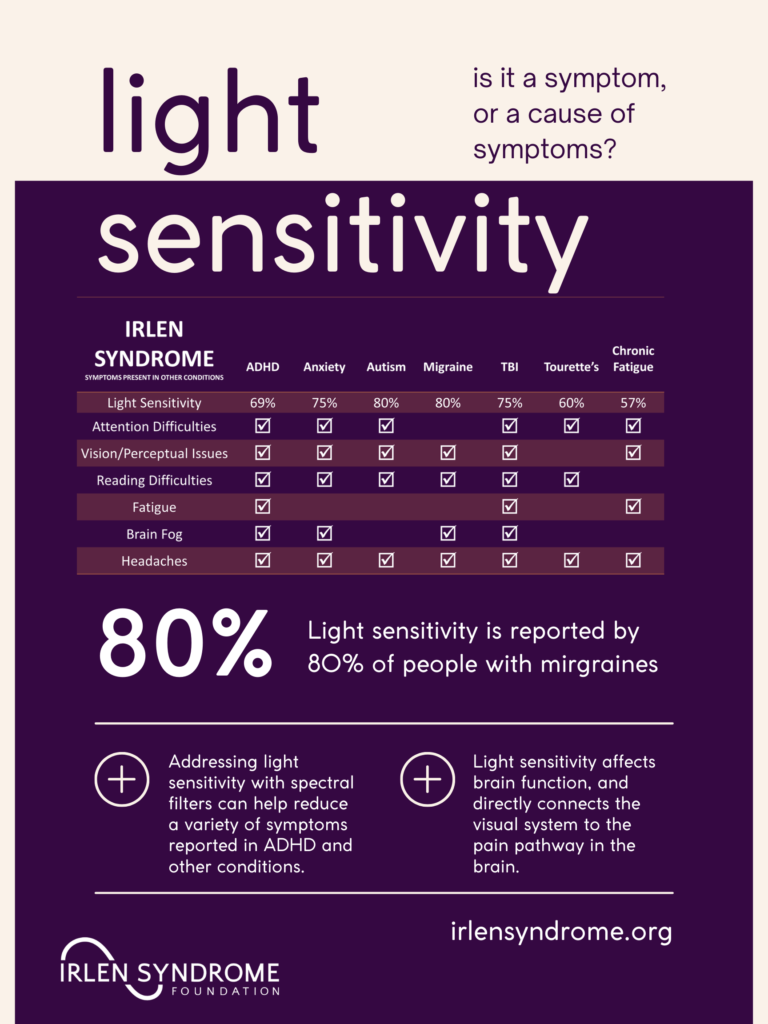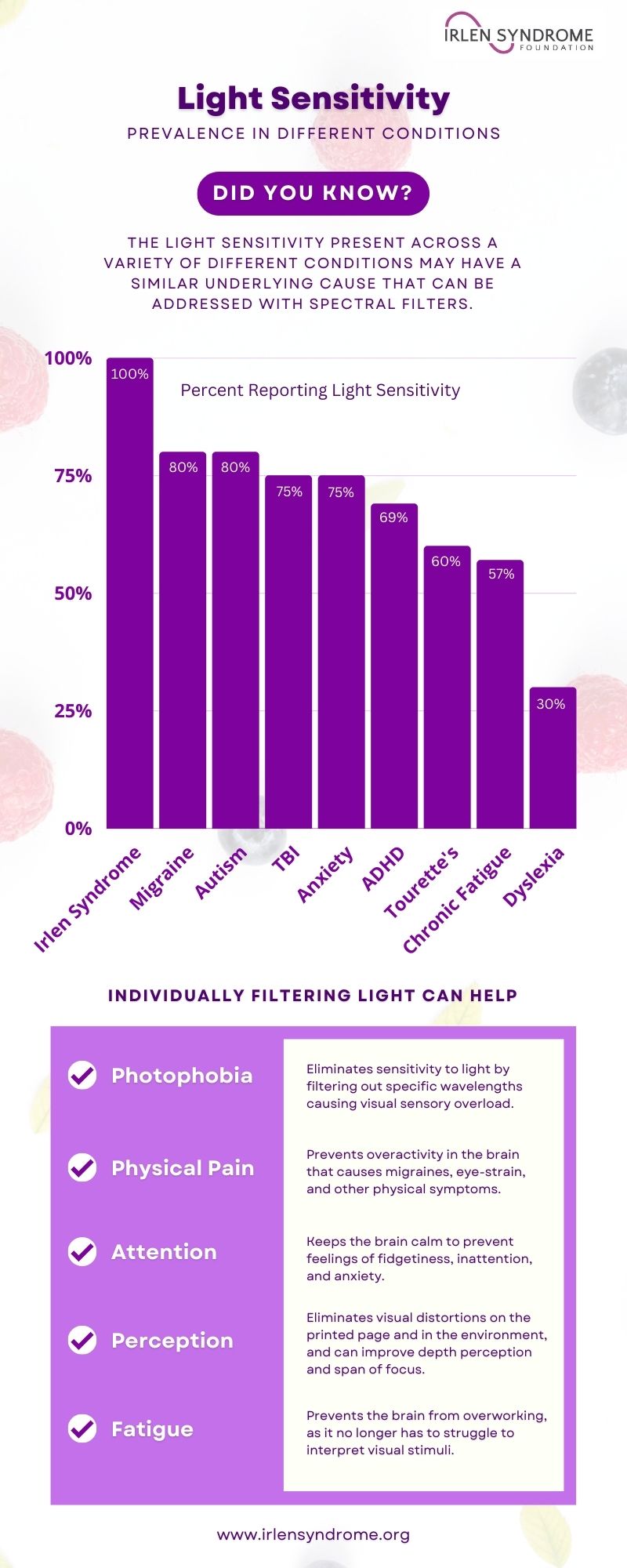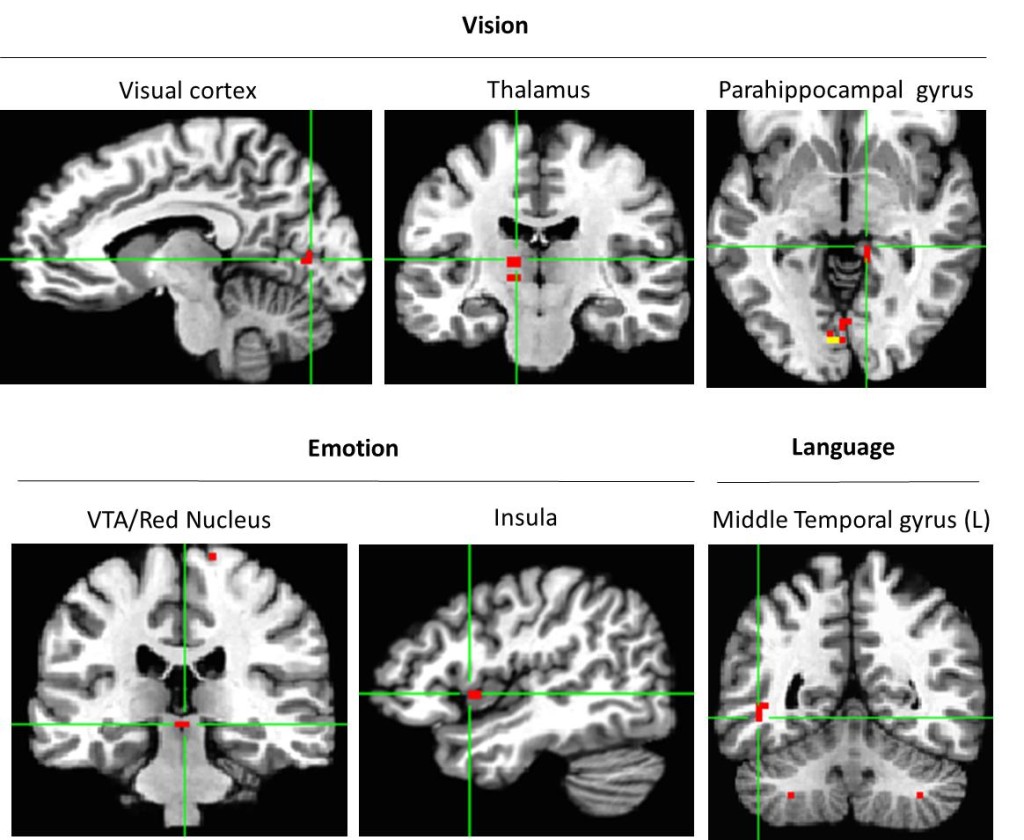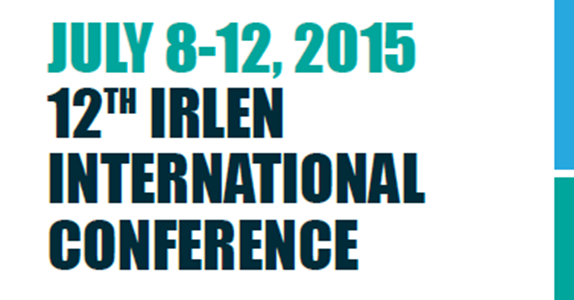Light Sensitivity is More Common Than You Think
Updates on Irlen Research at Cornell University
From the Desk of Professor Adam Anderson, Director of the Affect and Cognition Lab
October 13, 2016
“Color alters brain activity in ways that extend well beyond color perception to
influence brain regions supporting perception, thought, language, and emotion.”
Study #1: How Color Affects Brain Activity
We have just finished our first study on color and brain activity. In our efforts to understand the role of color on brain function, we examined how different colors influence brain activity patterns. Well beyond color perception, we found colors have distinct roles not only in altering visual system activity, including the primary visual cortex and the thalamus, but also higher level regions including the parahippocampal gyrus (involved in representing the environment) and the middle temporal gyrus (involved in language processing and motion perception). We also found colors influence limbic regions involved in emotions and feelings, including the anterior insula (emotional body states) and the ventral tegmental area (VTA, a region that produces Dopamine, a neurochemical that influences reward processing and cognition throughout the cortex). In sum, color alters brain activity in ways that extend well beyond color perception to influence brain regions supporting perception, thought, language and emotion. Although preliminary, such results provide foundational support for color filters as means to alter brain activity patterns in focal brain regions, and the functions these regions support. These results lay the foundational neuroscience groundwork for future studies looking specifically at Irlen Spectral Filters.
Study #2: How Color Influences Perception, Cognition, and Emotion: Irlen as a Brain-Based Condition
In our current study, we are building upon our earlier findings and undertaking more focused examinations of the influence of color on how information from the eye is represented in the brain, and the transmission of that information to the higher order portions of the brain that support perception, cognition (e.g., language and thought), and emotion. This study also assesses how colors influence brain activity to alter performance on tasks, including perceptual, cognitive and affective judgments. Results from this research will shed light on the neural mechanisms by which color can modulate brain activity and alter brain function. This study also examines the presence of Irlen Syndrome symptoms in the population at large, their neural bases, and whether these patterns of neural dysregulation are altered by color. These findings should help establish how, rather than a retinal visual disorder, Irlen Syndrome arises from dysregulated brain networks, with different brain regions supporting specific symptoms.
Help us support research that helps us better understand Irlen Syndrome, visit www.irlensyndrome.org and pledge your support today. The Irlen Syndrome Foundation is a 501(3)(c) charity organization. Donations are tax deductible. Our federal tax ID is 33-0409023.
World Leaders Speak At the International Irlen Conference
Every two years, the International Irlen Conference brings together world leaders in the fields of Irlen Syndrome, neuroscience, ophthalmology, education, and psychology. Meet this year’s keynote speakers:
KEYNOTE SPEAKERS

Marcia Reis Guimaraes, MD, PhD, is an ophthalmologist and eye pathologist with an educational background in molecular biology and basic sciences. She is an Assistant Professor of Ophthalmology, Embryology and Pathology at the Universidade de Sao Paulo and Universidade Pitagoras and invited professor of several universities throughout Brazil. She is Clinical Director of the Hospital de Olhos de Minas Gerais in Brazil. Dr. Guimaraes is also Director of the Irlen Clinic in Belo Horizonte, which is located in the Hospital de Olhos. She serves as Research Clinical Professor at the Federal University of Mina Gerais-LPAN (Laboratory Advance Research in clinically Applied Neurovisual Sciences).

Ricardo Guimaraes, MD, PhD, is a board certified ophthalmologist and founder and Director of the Hospital de Olhos in Minas Garais Brazil, the largest individual private eye clinics in Brazil. Dr. Guimaraes is also Assistant Professor at the Federal University of Minas Gerais (Brazil) and Director of the International Club of Surgery. He serves as President of the Brazilian Society of Refractive Surgery and maintains professional memberships in the Brazilian Society of Ophthalmology, the American Academy of Ophthalmology, and the International Society of Refractive Surgery. He serves on a number of editorial boards, including Highlights of Ophthalmology and Medical Editor for Ocular Surgery News for Latin America, and is currently serving as Honorary Consul of Canada in Minas Gerais, Medical Editor of Ocular Surgery New for Latin America, member of the board of the council of Health School – Universidade Pitagoras, Brazilian Institute of Marketing Economy (IBMEC), and Fundação da Associação Comercial de Minas Gerais and American Chamber of Commerce.

Jeffrey David Lewine, PhD, is Professor of Translational Neuroscience and Director of Business Development at the Mind Research Network, affiliated with the University of New Mexico. Dr. Lewine’s research uses behavioral and brain imaging methods including magnetoencephalography [MEG], electroencephalography [EEG], magnetic resonance imaging [MRI], and single photon emission computed tomography [SPECT]) to study brain structure and function. He has performed research on a wide range of clinical conditions including autism, attention deficit hyperactivity disorder (ADHD), depression, dyslexia, epilepsy, schizophrenia, post-traumatic stress disorder and traumatic brain injury. These investigations have been funded, in part, by Cure Autism Now, Johnson & Johnson, Illinois Department of Veterans Affairs, March of Dimes Birth Defects Foundation, McDonnell-Pew Program in Cognitive Neuroscience, National Alliance for Research on Schizophrenia and Affective Disorders, Orasi Medical, the National Science Foundation and the National Institutes of Health. Dr. Lewine has previously directed functional brain imaging programs in New Mexico, Utah, Kansas and Illinois. He is a member of the College of Scientific Reviewers for the National Institutes of Health and a member of the executive boards for the American Clinical Magnetoencephalography Society and the International Society for the Advancement of Clinical MEG. Dr. Lewine is the co-author of a textbook on functional brain imaging and he has co-authored more than 100 articles and book chapters.

Helen L. Irlen, MA, BCPC, LMFT, is a pioneer and global leader in the area of visual processing problems and an internationally recognized educator, researcher, and scholar. She is the founder and Executive Director of the Irlen Institute, which has over 138 affiliated Irlen Centers worldwide. Her method for treating visual processing deficits is used in over 45 countries. She is the author of Reading by the Colors and The Irlen Revolution: A Guide to Changing Your Perception and Your Life. Her newest book is Sports Concussions and Getting Back in the Game…of Life.
For more information about the Irlen International Conference, visit the conference website: IIC 2015






